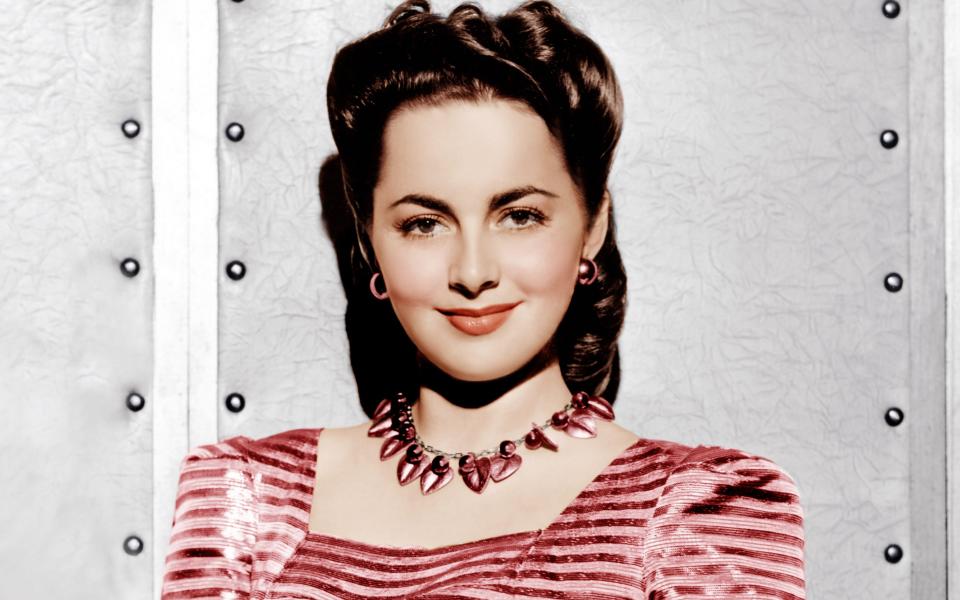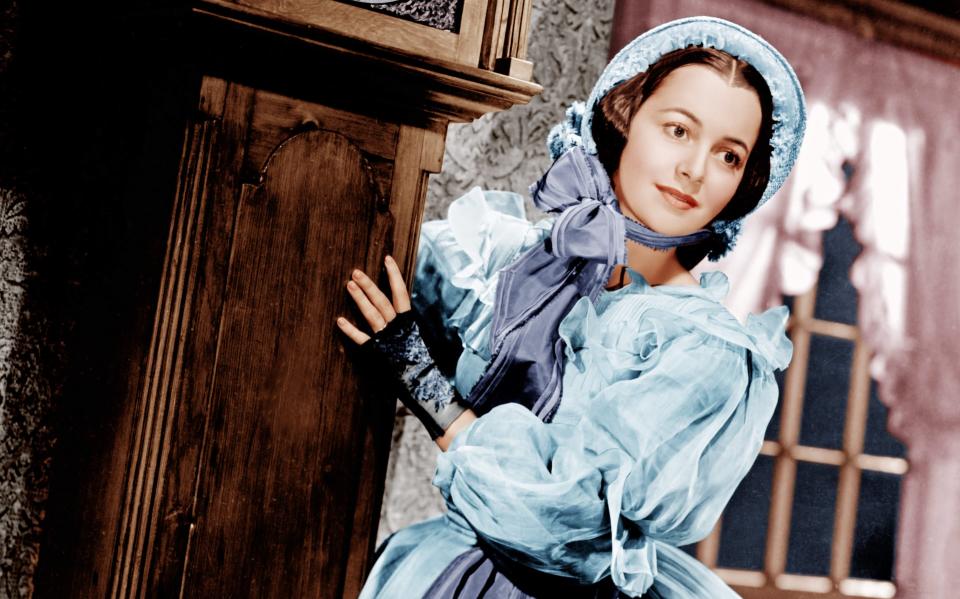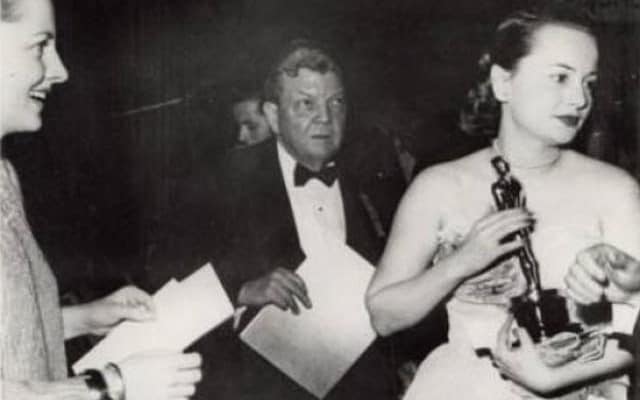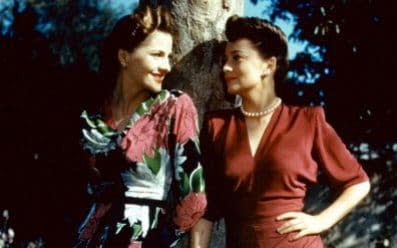Hollywood's coldest war: why Olivia de Havilland feuded with her sister, Joan Fontaine

"Olivia has always said I was first at everything,” said Joan Fontaine of her sister, Olivia de Havilland, to People magazine in 1978. “I got married first, got an Academy Award first, had a child first. If I die, she'll be furious, because again I'll have got there first!"
Olivia de Havilland, who has died aged 104, didn’t sound furious when Fontaine died at 96, back in December 2013, and issued an entirely normal-sounding statement of sisterly grief. But only one of the sisters crossed the 100 mark, and was Olivia. She may have been pipped at the post to everything else, but this feat – along with eventually winning two Oscars to Joan’s mere one – was hers alone.
De Havilland was one of the last true greats of the Hollywood Golden Age to battle on, along with Kirk Douglas, who died in February. She had legendary credits to her name, including the signature role of Melanie in Gone with the Wind (1939) for which Joan auditioned before she got the part.
It’s her relationship with her sister that got us all to lean in close, wondering if the record would ever be set straight. Depending on whom you believe, this was either one of the most storied and bitter rivalries in film history, or a fiction cooked up by the gossip-hungry press.
One version saw a Cold War enacted across decades, with rumours of little to no communication through much of the sisters’ adult life. The other – supported by Fontaine shortly before her death – swept this aside as bunk, saying they spoke and visited all the time.

It always seemed unlikely that de Havilland, comfortably ensconced in her Paris home these past decades, would feel driven to weigh in on the matter. According to her sister’s autobiography No Bed of Roses (1978), it began as classic sibling rivalry from their earliest childhood years. Olivia, the older sister by 15 months, rattled the crib and ripped her hand-me-downs.
One fight broke Joan’s collar-bone, and Olivia was a wicked bully in print, publishing a fake will in their high school newspaper with this devilish line: “I bequeath to my sister the ability to win boys’ hearts, which she does not have at present.”
They competed for the attentions of their actress mother, Lillian, especially after she moved them from Tokyo to Los Angeles post-divorce and they started jostling for parts in films. While Olivia got the earliest breaks, in Max Reinhardt’s A Midsummer Night’s Dream (1935) and a series of swashbucklers with Errol Flynn, Joan served as her chauffeur, despite harbouring her own ambitions as a star.

Deterred by their mother from seeking employment at Warner Bros, where Olivia was thriving, Joan got small parts at RKO, and then caught the attention of George Cukor in The Women (1939), right at the moment when Cukor and Selznick were engaged in their legendary Gone with the Wind casting blitz.
Fontaine – who chose her stepfather’s surname to set herself apart from Olivia – takes the credit for her sister’s casting as Melanie, simply because, according to her account, Joan turned up at the audition wearing overly chic clothes. “You’re much too stylish for the role,” Cukor is meant to have told her, to which she replied in a classic moment of shade, “Well, what about my sister?”
Imagine Fontaine’s envy if de Havilland had waltzed off with the Oscar for that part – Best Supporting Actress – which she was widely tipped to win. Instead, she lost on the night to the first ever black trophy-winner, Hattie McDaniel, in the same film.
The next year, it was Fontaine’s turn, up for Best Actress in another Selznick production, Hitchcock’s Rebecca. Even though the film won Best Picture, she lost to Ginger Rogers. And the year after that, 1941, both sisters were nominated – Joan for Suspicion, Olivia for the immigration romance Hold Back the Dawn.
Relations were understandably tense at the ceremony that night, and then Fontaine’s name was called out. “I stared across the table, where Olivia was sitting directly opposite me,” she wrote in her book. “‘Get up there, get up there,' Olivia whispered commandingly. “Now what had I done? All the animus we'd felt toward each other as children, the hair-pullings, the savage wrestling watches, the time Olivia fractured my collarbone, all came rushing back in kaleidoscopic imagery. My paralysis was total.”
It feels almost de trop for this great feud to have flared up in public at Academy Awards ceremonies – the stuff of What Ever Happened to Baby Jane?-style melodrama, rather than life. And yet it’s the way history records it. Fast-forward exactly five years, to the Oscars in 1946, and there’s a famous photo of the two sisters, captured by Hymie Fink of Photoplay, just after Olivia levelled the score by winning Best Actress for To Each His Own.

Fontaine is meant to have approached her backstage with congratulations, and De Havilland is seen giving her the cold shoulder. “Our relations have been quite strained for some time,” Olivia told a reporter afterwards. “I couldn’t change my attitude.” And her publicity agent, Henry Rogers, told the press that the two hadn’t spoken for four months. “Miss de Havilland had no wish to have her picture taken with her sister. This goes back for years and years, ever since they were kids,” he said.
There had been man trouble between them in the early Hollywood years, stoking the flames further. If it weren’t enough that Fontaine got married first – the first of four times – she did so to the English actor Brian Aherne, whom Olivia had once dated.
And on the night before their wedding, Olivia’s boyfriend Howard Hughes is meant to have discouraged Joan from going ahead with it: Hughes, the story goes, wanted Joan for himself. When this got back to Olivia, it did so directly from Joan’s mouth. Whatever her intentions, Olivia unforgivingly shot the messenger.

Over the years, though Olivia kept demanding apologies for Joan’s behaviour, things weren’t always openly frosty between them – there’s a photo of them laughing together at a party thrown by Marlene Dietrich in 1967. But another whopping grievance arose when their mother died, in 1975. Joan was out of the country and not informed about the funeral arrangements.
She threatened to call the press if she wasn’t allowed to attend. At the service, they didn’t speak, beginning a pattern of public avoidance which would endure in 1979, when they took opposite ends of the Academy stage for a 50th anniversary class photo, and at the equivalent event ten years later, when Joan, in the last Oscars appearance she would ever make, is meant to have switched hotel rooms so that she wouldn’t have to stay next to her sister.
Joan, in her later years, had a habit of denying the vendetta, even though much of the evidence for it is in her own written account. Olivia, for her part, used to adopt a queenly silence on the matter, showing no interest in raking over old coals.

But then she was moved to legal action three years ago by her representation in Feud, the FX drama series about the legendary catfights between Bette Davis and Joan Crawford. Played by Catherine Zeta-Jones in a side plot, she referred to Fontaine as a “bitch”, and de Havilland, at 102, sued Ryan Murphy's production for putting words in her mouth. She lost her court battle for defamation, and the Supreme Court rejected her plea to have the decision examined.
Amid this tussle to keep her dignified reputation intact, de Havilland was still uninterested in laying the long saga of her own sisterly feuding to rest. Why should she feel the need? Her years of resenting Fontaine as flavour of the month, or the supposedly prettier one leapfrogging over her own stellar achievements, were way, way back.
She was the more highly regarded actress by a long shot, and had that pair of trophies to show for it, however long she waited to get them. What’s more – Destiny’s Child crescendo, please – she was the survivor.


